Herd Health Benefits
- A barn full of healthy cows
- Reduced risk
- Best farm practices
- Improved production
- Better ROI
The challenge to realize these basic needs has never been greater. Establishing a solid working relationship between Lander Veterinary Clinic’s accredited veterinarians and producers can help achieve real and direct benefits to your farming operation.
At Lander Vet, the health of your herd is a top priority. Poor animal health is one of the primary constraints to maximum dairy productivity… and that goes right to your bottom line. Each herd and farm has its own unique ecosystem. There can’t be a “one size fits all” approach to services such as diagnostic pathology, herd reproductive programs or fresh cow and herd vaccination protocols among many others.
Each herd has widely different characteristics and varying conditions such as labor availability, environment, feeding strategies and financial constraints. Every herd may need a series of health-related interventions that are completely distinct from other farms in the Central Valley area. Lander’s staff of veterinary specialists work to understand your operation and create a customized herd health plan tailored and adapted to your specific needs.
- Herd Vaccination Programs
- Reproduction Services
- Reproductive Ultrasonography
- Routine On-Farm Consultation
- International and Interstate Animal Transport
- Healthier Heifers for a Healthier Herd
Herd Vaccination Programs
- Pre-breeding to calving
- Birth to six months
- Adult cattle
- Herd bulls
Lander Vet herd health plans include building and maintaining accurate records on medications, vaccinations, wormers, injuries, production, breeding and culling on each animal. A sound immunization program is an important part of your overall strategic herd health plan.
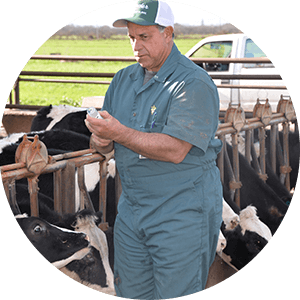
It’s a lot less expensive to prevent animal diseases through vaccination than it is to treat them. Most diseases don’t show up overnight. They can be subtle, even showing no outward signs, but production can be significantly reduced. It’s essential to pinpoint which disease is causing issues in the herd by working closely with an experienced Lander veterinarian before it spreads.
A vaccination schedule is recommended for dairy and beef heifers beginning at birth to six months of age. Additional schedules should be planned, with the assistance of Lander Vet specialists, for heifers pre-breeding to calving and similar plans for adult cattle and herd bulls.
Prevention can also be helped when producers maintain a sanitary environment, provide proper ventilation and take immediate action when animal health issues occur.
Reproduction Services
- Custom planning
- Improve production
- Improve pregnancy rate
- Improve profitability
- Bull breeding exams
Have you ever thought of your cows as “employees”? You give her proper housing, nutritious food, water, health benefits and in return, she comes to the parlor 2-3 times a day to be milked… “working” for about 15 minutes each time. Her job is to produce high quality milk.
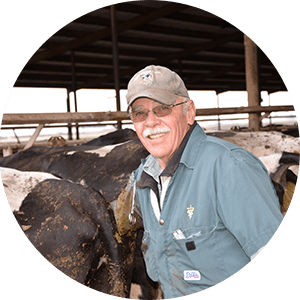
For that quality milk to be available, she must have a calf to stimulate mammary development. As a producer, you know the most productive time of lactation is during peak milk. The more time your cows spend working during that most productive time in their lifetime, the more profit they’ll generate. You need to maximize that time.
Which leads us to planning for regular, consistent pregnancies. Your reproductive program should be a top priority on the farm as a new revenue stream. Lander Vet specialists can help develop practical reproductive plans customized for your operation and herd goals.
Herd checks are a common veterinary procedure and regularly begin by 5 a.m. on dairy farms. Bred cows are checked rectally by palpation or ultrasound to determine pregnancy. Lander veterinarians are experts in reproductive services. Herd checks can offer an opportunity to also check for lameness issues, body condition, udder health, sanitation environment and feed consumption,
Breeding defects and sub-optimal fertility in herd bulls can affect profitability. Lander Vet specialists perform semen analysis and bull breeding soundness exams that help maximize reproductive performance for herds utilizing natural service.
Reproductive Ultrasonography
- Establish conception dates
- Determine fetal sexing
- Detect early embryonic loss
- Evaluate ovarian activity
Ultrasound pregnancy scan may be used to accurately establish early embryo detection within a 26-30 day range. In addition to early pregnancy detection, ultrasound is preferred by many producers rather than rectal palpation to predict a more precise calving date, reduce the risk of inducing embryonic loss and to determine fetal sex in the 2nd month of gestation.
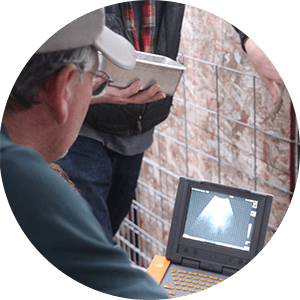
Additionally, ultrasound can be helpful in the diagnosis of disorders of other soft tissues including teat injuries, kidney, liver and lung.
Lander Veterinary Clinic team of reproduction specialists provides both in-house and on the farm services to dairies and ranches within the Central Valley area.
Routine On-Farm Consultation
- Save time and money
- Maximize animal performance
- Production medicine
- Preventative medicine
Herd health is a blend of art and science when our experienced veterinarians work as a team in consultation on-site with our clients. We routinely integrate principles such as herd immunity, immunology, production medicine and preventative medicine with your specific experience and concerns regarding an individual animal or your overall herd.
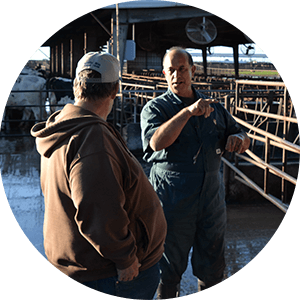
Establishing long-term relationships with our producers through regular herd visits to your dairy or beef operation, can provide sensible options to maximize animal performance and minimize herd disease problems.
Common herd health problems that we encounter include investigations for mastitis, abortions, calf diarrhea and pneumonia outbreaks, Johne’s disease, feeding issues, and high levels of fresh cow transition maladies — milk fever, ketosis and retained placenta, for instance.
Solving herd-wide problems frequently requires laboratory support and digging deeply into management practices on the farm. Dairy Diagnostics, Lander Veterinary Clinic’s laboratory arm, conducts a wide array of in-house tests and works closely with numerous state and national disease diagnostic laboratories to facilitate finding solutions to frustrating problems.
International and Interstate Animal Transport
- California CVI Forms
- Permit Number
- Official ID for Species
- Veterinary Tests for Disease
Lander Veterinary Clinic has an essential role in the animal movement process from completing the California CVI forms and obtaining the permit number to knowing what constitutes official ID for each species.
We commonly perform testing for tuberculosis, brucellosis, blue tongue, anaplasmosis and other cattle diseases that are required to move cattle from California to other states. We also write legal interstate health certificates (CVI), working with state veterinarians throughout the US and other countries (export).
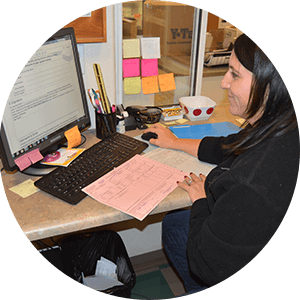
California Department of Food & Agriculture Rules:
All Dairy Breed Cattle
California requires a Certificate of Veterinary Inspection (CVI) for all cattle within 30 days before movement into the state.
Exemptions:
Cattle moving directly to slaughter are exempt from the CVI requirement if brand documents or owner/shipper statements accompany the shipment.
Official Identification
All dairy breed cattle must have Official Identification (ID) and it must be listed on the CVI.
Brucellosis
California requires official brucellosis calf-hood vaccination and a legible brucellosis tattoo for all female cattle over 4 months of age before movement into the state. If the tag is lost, a “silver brite” tag is acceptable with the tattoo. For cattle movement from a Designated Brucellosis Surveillance Area, California requires a negative brucellosis blood test obtained within 30 days before movement and a special entry permit.
Trichomonosis
California requires a negative individual trichomonosis test on bulls 18 months of age and over, sampled 10 days after last contact with sexually mature cows, and within 60 days before movement into California. California requires a Certificate of Veterinary Inspection (CVI) issued within 30 days before entry with the statement, “Trichomonosis has not been diagnosed in the herd of origin within the past 24 months.”
Tuberculosis (TB)
California requires a negative TB test for dairy breeding cattle 6 months of age and over, obtained within 60 days before movement into the state.
Resources:
Healthier Heifers for a Healthier Herd
Heifer calves are the future of your dairy. Ensuring your calves are as healthy as possible through nutrition, housing, sanitation, and vaccines can help improve the long-term productivity of your herd. While scours are the hallmark disease of hutch calves, pneumonia is another significant disease that can affect the long term health of your cattle, from decreased average daily gain, increased age to first breeding, increased age to first calving, to decreased milk production throughout their first lactation and their lifetime.
Thoracic Ultrasound can be used to diagnose early pneumonia and help direct your calf management program to decrease your incidence of pneumonia in hutch calves as well as monitor treatment success. Thoracic Ultrasound is quick, non-invasive, and provides plenty of information about the overall lung health of your hutch calves.
Pneumonia in hutch calves can be particularly frustrating as many calves with pneumonia never show any symptoms but still are profoundly affected later in life. It is estimated that for every case of pneumonia with symptoms (coughing, fever, etc) there are 2-4 cases that never show any symptoms that they are sick. The use of Thoracic Ultrasound can help identify these asymptomatic calves and ensure they are appropriately treated for optimal lung health.


